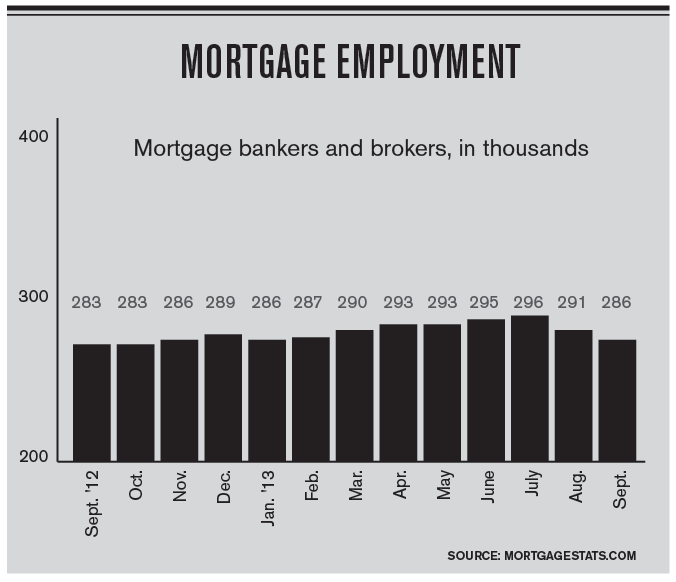Mortgage Brokers
Another effect of these new regulations will be a shortage of mortgage brokers. According to Calk, there is a gap between new regulations, like the QM, and mortgage brokers, and many mortgage brokers’ lower level of regulation may de-value their services in the eyes of consumers.
The way mortgage brokers do business, Calk says, will have to change, partially because of the effect of implied institutional legitimacy on consumers. However, banks have another advantage: they have the financial ability to loan beyond the QM guidelines set forth by Dodd-Frank.
“Mortgage bankers will be very restricted regarding any non-QM product that they can offer, [because] the rates on that product will probably continue to be higher than they already are,” Calk says. “That will, unfortunately, make it harder for some homeowners to buy at that price.”
Those increased costs to mortgage brokers, combined with the smaller pool of qualified buyers, will surely increase the level of competition in the marketplace, says Renkes.
“Each lender is fighting tooth and nail for any business, and we are going to see more professionals leave the market … lenders are going to be increasingly competitive with rates to achieve the highest market rate they can,” she says. “We are going to see a lot of crying and kicking to keep business.”
James Burke, the home lending senior branch manager at Flagstar Bank, believes that mortgage brokers have done a fairly good job acting as advocates for their clients, but as the mortgage market turns, there will certainly be a lot of credibility in working with FDA-insured institutions.
“I’m not saying that mortgage brokers will go away, but the biggest issue they’ll be facing going forward is the cost of compliance,” he says.
Predictions for 2014
Despite increased regulations in the mortgage industry, the complexity of Dodd-Frank, the harsh realities of its complete implementation and the decrease in monetary support from the Fed, it appears that 2014 already will be a great year for most professionals in the real estate industry.
Buyer demographics will change. Fewer young and first-time buyers will be able to meet the QM requirements, and the decreased affordability, however negligible, will have an effect on those buyers as well. We can expect to see an increase in attention of rental properties. In addition, early projections for 2014 call for another year of increased interest in the rental market, and this appears a likely outcome as homebuyers earning a lower income will be less likely to qualify for QMs.
Renkes sees the number of new homes increasing in 2014 as well, which was largely at a standstill during the recent recession.
“The market has been flooded with distressed properties, but there are many positive signs pointing for those to decrease. If construction starts to become the hot thing again, that will be good for everybody,” she says. “Distressed sales will start to decrease as the inventory is diminished and the economy has improved; as home values continue to increase, the necessity for short sales will decline. These are all positive signs we’ve been seeing in the market.”
Burke also has great expectations for the upcoming year, saying that “from a historical perspective, mortgage rates are still really low. With the improving labor market, you are going to have a higher rate of household formation.” According to his estimation, this extends to first-time homebuyers as well.
“I think there will be a lot of opportunity for first-time buyers … value has come back, and maybe these people are less in the water and are in a position where they can sell and move up,” he says.
Calk believes that Dodd-Frank is a good first step towards a healthy real estate landscape in post-recession America, and hopes that further legislation will continue to improve and refine the necessary processes.
“We believe strongly that folks understand that homeownership is still the preferred living standard in America, and we are looking for a good recovery and hoping that further methods will be used,” he says. “We believe they will be, in order to facilitate recovery in the next year or two.
“So much of everything that we do in this country all begins with our core value of homeownership,” says Calk. “If someone owns a home, whether it’s a condo or single-family home, they just care more about their street, more about their neighborhood and more about their town and city. There has never been a more important time for us to be diligent, and insure that people who are responsible enough to handle mortgage debt are given every opportunity to do so.”C.A.


When did the FDA start regulating financial institutions?